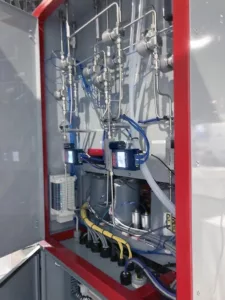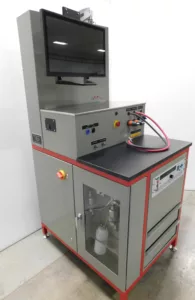- Fuel Cell Testing: Flow and Pressure Solutions
- Ludlow Electrochemical Hardware automates and enhances the efficiency of fuel cell test stands
Ludlow Electrochemical Hardware automates and enhances the efficiency of fuel cell test stands
While manufacturing electrochemical hydrogen pumps, Ludlow Electrochemical Hardware faced validation challenges: The test stands the company was using were complex and labor-intensive. Ludlow opted to develop a custom solution, integrating Alicat flow controllers. These automated fuel cell stands, now sold to other manufacturers, improve efficiency in fuel cell research, contributing to the ongoing development of solutions in the hydrogen economy.
The hurdles the company faced underscore the need for innovation across the hydrogen economy:
Challenges

Alicat controllers inside a Ludlow test stand
- Complexity and Lack of Automation: The test stands they had purchased proved to be a “rat’s nest of tubing and wiring” and lacked full automation capabilities, making testing cumbersome and less efficient.
- Multi-Year Testing Needs: Ludlow frequently ran multi-year tests on numerous cells, which required reliable and long-term test stand solutions.
Solution: Do it yourself
Ludlow Electrochemical Hardware designed their own industrially designed test stands to guarantee precision and reliability in their testing. Rotameters were replaced by Alicat anti-corrosive mass flow controllers, and manually controlled diaphragm back pressure controllers were replaced with Alicat back pressure controllers. A PLC took the place of manual control, and the system was set up for real time monitoring and control.
The benefits from these stands were so significant that other manufacturers began requesting their own test stations. Over the years, the stands gained so much popularity that electrochemical test stations became a key part of Ludlow Electrochemical Hardware’s offerings.
Key features of Ludlow test stands include:
- Seamless Tests: The test stands maintain precise control over key parameters such as flow, current density, and pressure. Ludlow stands can be equipped with a unique pressurization option, ideal for certain hardware components that are sensitive to high differential pressures. In this test, two Alicat back pressure controllers precisely control the pressure differentials across the anode and cathode so that they remain within optimal ranges.
- Automated Testing + Remote Control: The machine features two separate high and low voltage cabinets equipped with hydrogen sensors and Alicat flow and pressure controllers, all communicating with a PLC. These fully automated test stands run two tests at once, 24 hours a day, reducing human errors across the testing process.
Alicat Controllers: A Vital Component
In addition to increasing the precision and reliability of tests, the Alicat flow and pressure controllers have proven to be both handy in the Ludlow lab and easy to automate. The combination of a user-friendly display and protocols like EtherNet/IP streamlines integration into the testing systems. The Alicat controllers offer additional benefits:
- Timesaving: The availability of a catalog of calibrated gases and gas mixtures on Alicat flow controllers eliminated the need for engineers to manually calculate gas correction factors when changing gases, allowing technicians to quickly change gases and conditions in the tests, moving directly from one test to a new one.
- Optimized Performance: Technicians can program custom gas mixtures tailored to specific testing requirements—and have accurate mass flow measurements of them on the fly—ensuring precise control over gas flows.
- Flexibility: Alicat controllers’ high turn-down ratios meant each device could be used for a larger range of flow rates, reducing the number of units per setup. Easy changes in engineering units meant easily adapted reporting to suit customers.

A Ludlow test station
A Big Impact
From struggling with complex and non-automated test stands, to developing their own industrially designed solutions, Ludlow Electrochemical Hardware has not only improved their own testing processes but also extended their innovation to benefit other fuel cell manufacturers. Alicat Scientific is pleased to work with innovators across the hydrogen economy, including Ludlow Electrochemical Hardware, in advancing the global shift toward a cleaner world.